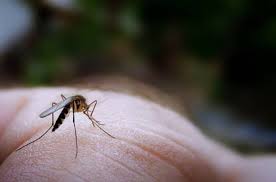The likelihood of being bitten by mosquitoes could be down to genes that control our body odour, a preliminary study in Plos One suggests.
Researchers tested pairs of identical and non-identical twins to see how attractive they were to mosquitoes.
Identical twins were more likely to have similar levels of attractiveness – suggesting shared genetic factors were at play.
The “intriguing” results must now be assessed in larger trials, experts say.
Researchers have long tried to understand what drives mosquitoes to bite certain people more than others. Recent work shows the insects may be lured to their victims by body odour.
And anecdotal reports suggest some relatives are just as likely to be bitten as each other.
Scientists wanted to find out whether genes were behind this phenomenon.
To test their theory they enlisted 19 non-identical and 18 identical pairs of twins in a pilot study.
Identical and non-identical female twins took part in the study
In a series of experiments each twin placed one hand at an end of a Y-shaped wind tunnel as air was pumped through, carrying odour with it.
Swarms of mosquitoes were then released and moved towards or away from each twin’s hand.
For identical twins – who share much of their genetic material – there was an even distribution of mosquitoes in both sections.
This suggests the insects did not prefer the odour of one hand more than the other.
In contrast, results for the non identical twins – who share fewer genes – were more varied.
Researchers say their works suggests attractiveness to mosquitoes could be caused by inherited body odour genes.
Providing an independent comment, Dr David Weetman, lecturer at the Liverpool School of Tropical Medicine, said: “This is a novel and intriguing finding.
“But mosquitoes are not just attracted to scent – things like carbon dioxide also play a role.
“Larger studies will help assess how relevant these findings are outside the laboratory where other factors may be important.”
Lead author Dr James Logan said: “If we understand the genetic basis for variation between individuals it could be possible to develop bespoke ways to control mosquitoes better, and develop new ways to repel them.”
Source: BBC
N.H.Khider

